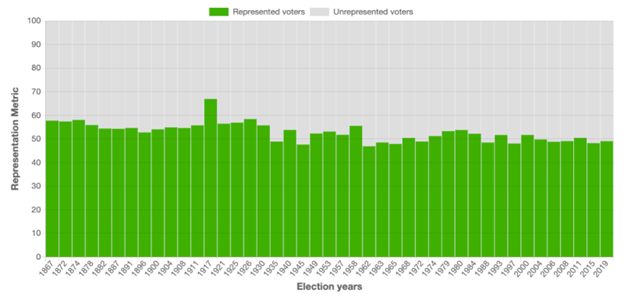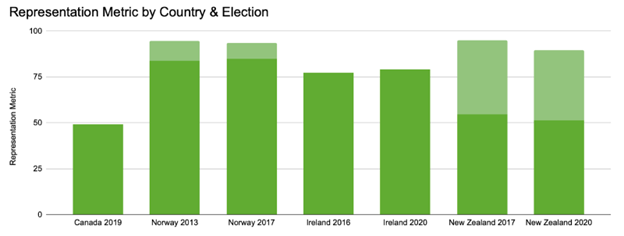As we shared with you in our last message, we’ve now submitted all our written arguments for the upcoming Charter Challenge court hearing (Sep 25-27 in Toronto). We’re currently waiting to receive the government’s written argument and are now working on our oral arguments.
In the meantime, we wanted to share with you a few more details from Fair Voting BC’s affidavit, which presents some insightful metrics we’re using to reinforce a number of our key arguments.
In a previous message, we reported that over half the voters in the 2019 election cast “wasted votes” (votes that didn’t help elect an MP). While this was true in that election, the court will want to know if this is a consistent pattern across time, and if changing the voting system will likely change this.
To answer this question, we defined a Representation Metric that could be calculated both for countries such as Canada that use the First Past the Post voting system and for countries that use proportional voting.
More Than Half the Votes Are Wasted in Canadian Elections
In Canada, the Representation Metric is simply the proportion of voters who cast a vote for an elected candidate. Thanks to work by Byron Weber Becker (University of Waterloo), we were able to show that for nearly the past hundred years (since 1935) the Representation Metric has averaged less than 50% over the past 40 years.

Representation Metric for all federal elections in Canada since Confederation. The Representation Metric expresses the percentage of voters who have voted for an elected MP. Since 1984, the Representation Metric has averaged just 49.8%.
Are As Many Votes Wasted Under Proportional Voting?
Absolutely not. In Proportional Representation (PR) voting systems, the Representation Metric is typically much higher (and the “wasted votes” much lower), because far higher proportions of the ballots cast affect the resulting makeup of the legislature. To demonstrate this point, we analyzed the results of recent elections in three countries using different types of PR systems (Norway (List PR), New Zealand (MMP), and Ireland (STV)). Under all three of these systems, the Representation Metric would have been far higher, ranging from about 77-79% under Ireland’s ‘direct representation’ STV system up to as high as 94-95% under Norway’s List Proportional Representation system.

Representation Metrics for Canada (2019 federal election) and two recent elections in each of three selected countries using proportional voting (to demonstrate consistency of findings). The darker shade represents those voters who are represented by a representative for whom they have explicitly voted (‘direct’ representation), while the lighter shade represents those voters who are represented by a representative who won a seat by virtue of votes cast for the representative’s party (‘indirect’ representation).
This evidence is critical for us to make the points that (1) our recent experience in Canada is not an anomaly, but rather a routine and expected outcome of elections under FPTP, and (2) any number of alternative voting systems would markedly increase the proportion of represented voters.
Charter Challenge In the News
The Charter Challenge is in the news! Maxwell Cameron, a professor in the Department of Political Science and the School of Public Policy and Global Affairs at the University of British Columbia, contributed an opinion piece to The Globe and Mail titled “The Charter challenge of first-past-the-post could lead to a better electoral system.” To read the piece, click here.
Thank you so much for your continued support. More details shortly!
Jesse Hitchcock, Springtide & Antony Hodgson, Fair Voting BC
Stay tuned to this blog for updates on electoral reform and the Charter Challenge for Fair Voting.
Get Charter Challenge updates by following SPRINGTIDE on Facebook and Twitter.
Sign up for email updates from the Charter Challenge for Fair Voting here:
By subscribing to this list you consent to being contacted by both Springtide and Fair Voting BC.
-
 Jesse Hitchcock published this page in Blog Updates 2023-08-18 13:43:43 -0300
Jesse Hitchcock published this page in Blog Updates 2023-08-18 13:43:43 -0300


